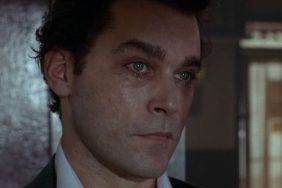The title refers to the Rampart Scandal of the late 1990s. The Rampart police division in Los Angeles was exposed as being one of the more corrupt police divisions in the city’s history. Many of the officers involved, as part of an anti-gang unit called CRASH, were found to be making erroneous arrests and freely beating up, robbing, raping and sometimes murdering random people throughout the city. The fun part of the scandal was its alleged tie-ins to Death Row Records, and the allegations linking certain cops to the Biggie/Tupac rivalry/murders.
Curious that Oren Moverman, the director of The Messenger, should choose to make a drama about the Rampart scandal at this late date. Police corruption may be eternal, but aside from the scandal’s vague lasting political legacy (some claim that L.A.’s current mayor Villaraigosa won his seat from his predecessor because of the scandal), I fail to see how a look at the Rampart scandal is relevant.

Luckily for us, Moverman has managed to make a stirring and stylish character study from the material. Woody Harrelson plays a decidedly corrupt cop named “Date Rape” David Brown whose moral emptiness reaches so deep, he doesn’t seem to realize that he’s doing anything wrong. He doesn’t like his nickname, but, hey, he knows he’s got it. How does one get the nickname of “Date Rape?” Luckily, it’s not what you’d think. Brown killed a date rapist in cold blood a few years previous, claiming it was in the line of duty. We get the sense, over the course of the film, that Brown narrowly avoided jail time, and that the only thing keeping him on the job in a long-ingrained system of good-ol’-boy politicking and institutionalized cover-ups.
Brown is a horrible human being. He’s not quite as melodramatically evil as, say the Bad Lieutenants, but he is a bully and a scoundrel. He is mean to women, and he uses racial slurs. He has two daughters, one a teenager (Brie Larson), both by a different sister. He lives with both sisters (Cynthia Nixon and Anne Heche), and doesn’t seem to like anything about his home life. When he becomes mildly horny, he propositions both sisters. When that fails, he goes to a seedy bar. Later in the film, an investigator asks him about his racist tendencies. He seems to tell the truth: “I’m not racist. I hate all people equally.”

When Brown is caught on tape beating up a seemingly innocent man (echoes of Rodney King), an investigation on his behavior begins in earnest. He’s allowed to keep his job, but his peers begin to dismiss him; they will no longer put up with his crap. From there, we see Brown’s life fall apart as all he had built up in a line of violence and impatience and outright vice begins to crumble. As his life falls apart, we see small pieces of remorse in his eyes. But not well-thought-out remorse. Brown is far too corrupt to really realize the damage he’s done to the LAPD, to his peers, and to his family. Near the end of the film his teen daughter demands an apology. He looks up with puppy dog eyes and asks earnestly, “Did I hurt you?”
The screenplay for Rampart was co-written by the famed crime novelist James Ellroy, who has written some of the most acclaimed L.A. crime novels this side of Raymond Chandler. L.A. Confidential and The Black Dahlia are staples in any crime fiction library. As a screenwriter, however, he has fared less well, having written the confusing 2008 clunker Street Kings. Moverman co-wrote this, and I’m guessing that it was his idea to focus the story less on the actual corruption, and more on the frustratingly unchanging mind of a corrupt cop. Here, we get to see corruption from within. This is not a well-meaning man swept into a mob-like crime family run by crooked cops. This is an instinctively crooked man who bent the system.
No thrills, no secret plots, and no obvious politics, Rampart is a powerful and moving look into an empty person. By the end of the film, Brown finds himself staring into the abyss. Guess what stares back?







